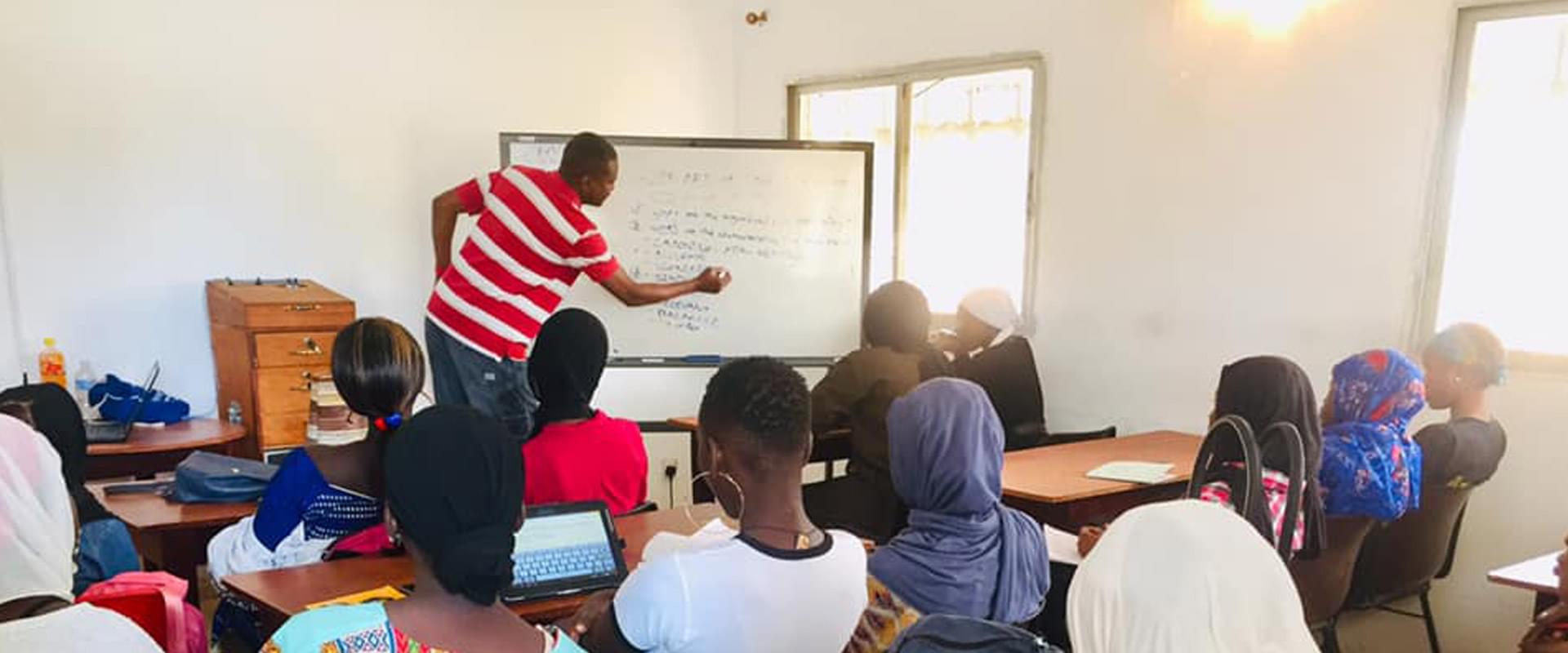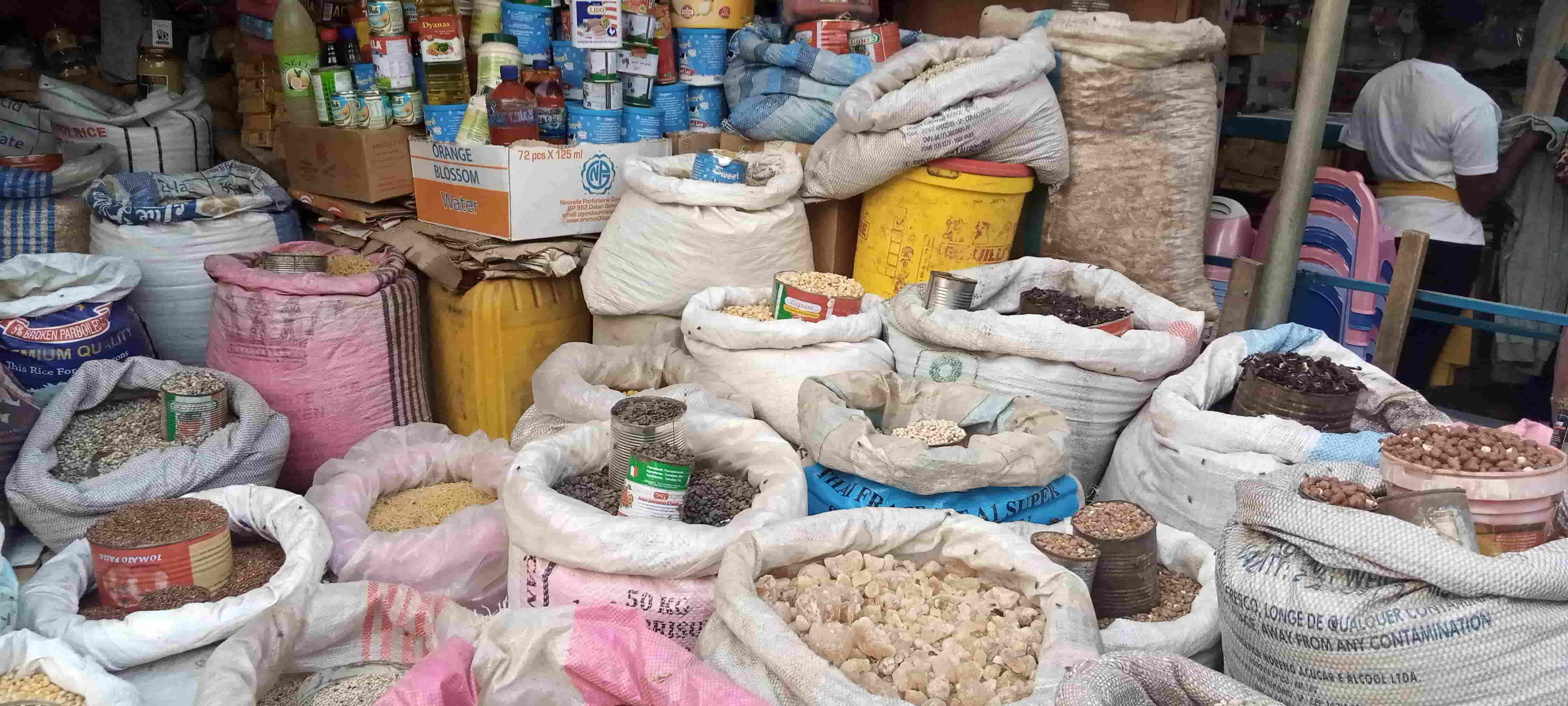
Dec 2, 2021 9:07 AM | Article By: Adama Camara

Basic commodities displayed at the Serekunda market
The average
Gambian survives from hand to mouth due to poor salaries and wages they receive
at the end of every working month. This is not commensurable with the
frustrating market realities as the price of the most basic food commodities
keep rising exorbitantly and frequently. Affordability of such items have
become one of the crucial factors to decide the upcoming presidential election
to be held on December 4, just a few days away.
Muhammad Camara,
a father of six told MAJaC News that all the income he earns is spent
on feeding. He said the high cost of feeding affects his allocations for
other needed areas such as taking care of the health and education of his
family.
“Even taking
my children to hospital when they are sick is a
problem because my earnings stop at feeding my family.”
The December
election is timely for Muhammed, just like it is for other Gambians. He vowed
to use his marble wisely for a candidate he believes would turn things around
in the market. For him, candidates who share a practical agenda for an
increased food production thereby reducing high dependency on expensive
imported food items will get his vote.
A housewife,
Fatou Bojang, said the price hike of food items has created nutritional shortages,
as most people could not afford the practice of a balanced diet anymore.
According to her, D150 is no longer enough to buy a good fish from the market.
“I might not even
vote in this coming election because an empty bag cannot stand. I cannot go to
the polls while I’m hungry. If this is not addressed, I might end up begging to
feed my family because my husband is sick and I cannot even afford three square
meals a day.”
Fatou blamed the
business people for the frequent increase in price of food items, stating that,
it is now common to find an increment on a particular item just within a few
days.
For Mariama
Jatta, a consumer, she blamed the politicians for not prioritizing the market condition
that is affecting the whole nation, rather, waging personal attacks against one
another on political platforms. She described livelihoods as very difficult in
the current situation.
“Help me to get
rich while we remain poor is what politicians are vying for but not to address
our needs.”
Irish potato and other basic goods on sale at
SereKunda market
A recent price
finding conducted by this platform as of December 2 has shown that a bag
of rice costs D1, 500, a bag of sugar is D1,700, a bag of onion
is D650, locust beans (neteto) is now 10 dalasis, and a cube of jumbo
is now D2.50.
During the
lockdown period necessitated by COVID-19 last year, the Ministry of Trade has
issued a statement setting the prices of basic commodities, a decision which
also threatened to penalize business people who are engaged in hoarding.
However, the
market is no longer adhering to such proclamations even when the government
never came to lift the order.
Mamad Salieu,
stall owner at Serekunda market selling various foods, blamed the
high cost of commodities on the prices they also bought at, as well as the
expenditures they incur from transportation and taxes. He said their primary
objective is to make profit.
He has challenged
the winner of the upcoming election to reduce the high taxes imposed on
businesses which he believes would lead to ease in pricing of commodities,
especially food items.
What promises are candidates making about it?
2021 Presidential Candidates, PC: IEC Archives
Essa Faal, an
independent candidate, published his manifesto last month, outlining his plans
to ensure food security in the country. He promised to create a thriving sector
for the increased production of large and diversified food baskets that will
also guarantee a sustainable employment in 10 years.
“Improved
efficiency in food production and processing, and a huge reduction in food
waste in the first 3 years of my government,” Faal's manifesto stated.
Faal believes
that Gambians will find a sustainable balance in market price of basic food
items when such commodities are produced in the country rather than relying on
importation.
The United
Democratic Party (UDP), the perceived main challenger of the incumbent, has
also outlined their manifesto in a 5-point agenda. UDP has promised its
commitment to eradicate child malnutrition, guarantee food security for the
entire population by motivating farmers.
“So, they will
stay on the farm because if you look at the farming community is dwindling, we
are having more people and fewer farmers. So where do you get food? You import
it at the expense of a huge amount of foreign exchange,” Lamin Manneh, who is a
leading figure in drafting of the party’s agenda, told The Standard.
“We want to revert it. Import substitution, produce the food
here and keep the foreign exchange, and at the end, sell part of that food and
earn foreign exchange. That is the way forward for the Gambia,” Manneh added.
Meanwhile, Halifa Sallah, the leader of the People's Democratic
Organisation for Independence and Socialism (PDOIS) has promised to create cooperative sector that will accumulate cooperative
finances to support family farms, create small scale processing of grains, nuts
fruits and vegetables as part of the plan to eradicate poverty and creating
balance in the market by also encouraging women producers and vendors.
“They live in poverty, grow in
poverty, age in poverty, and die in poverty. That is what we wish to end. How?
By using your wealth. Twenty-three billion [dalasi] is your budget this coming
year (2022). The ocean is here. Others are exploiting it,” he said.
In the party’s transformative
agenda, PDOIS also promised to increase
the individual income and community income to rise proportionately to
facilitate availability and affordability of food.
One of the newest political parties contesting the election is
the National Unity party (NUP) led by Abdoulie Ebrima Jammeh, former Director
General at the Gambia Civil Aviation Authority (GCAA). During his nomination,
he told journalists that his first task, if elected president would be
stabilizing the economy, the impact of which will regularize the market
turbulent. “We need to rebalance our economy when we are elected. This is
an immediately priority,” Jammeh said.
Like other candidates, Jammeh’s manifesto has promised Gambians
a better coordination and implementation of agricultural policies to ensure
economic growth and reduce poverty in the country.
The incumbent Adama Barrow, also the leader of the National
People’s Party has consistently blamed the high cost of commodities on the
global market system, which is suffering from the wreck of COVID-19. However,
he has promised to provide support to local farmers to increase productivity of
food items such as rice and other agricultural products.
At a campaign meeting held in Jarrol, Foni, last week, Barrow promised to execute a plan worth of over
$175 million investment plan in
the field of Agriculture. According to him, “there is US$80 million plan for rice production, US$28 million for
storage, US$27 million on rearing of goats and sheep and another additional
US$40 million coming into the agriculture sector”.
The Gambia Democratic
Congress has provided in their manifesto that they will put a sound economic policy in Agriculture, Tourism and Fisheries
Development.
Expert view
Nyang
Njie, Gambian economist, PC-TFN
An economist, Nyang Njie, said high cost of living is
attributed to high inflation that makes people's purchasing power less. He said
it could also be attributed to higher unemployment, which makes people not
being able to make an income to feed themselves.
To tackle the
problem, Njie suggested that the government should reduce taxation imposed on
imports like flour which is a buy-product of bread.
“Most of the
vegetables that Gambians eat are imported. So it's high time to grow these
vegetables in the country, thereby making it cheaper and accessible to all
Gambians,” he said.
He said Ministry of Finance and
Economic Affairs should work closely with the Ministry of Trade
and the Ministry of Agriculture to find ways and means of making
food available and accessible, especially to the poor
Comments (0)
136 Likes
Leave your thought here
Your email address will not be published. Required fields are marked *